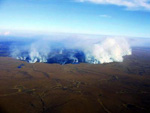By the time children born this year reach 50 years old, the Earth could be 4 degrees Celsius warmer (7.2 degrees Fahrenheit) warns a new study as governments meet in Cancun for this year’s UN climate summit, which is not expected to produce an agreement. Last year governments pledged in the non-binding Copenhagen Accord to keep temperatures below a 2 degree Celsius rise, but a new study in Philosophical Transactions of the Royal Society A argues that even with current promises to cut emissions this is unlikely and, in a worst-case scenario, a rise of 4 degrees Celsius is possible by 2060.
But what would a 4 degree rise mean in 50 years time?
In a series of papers, researchers paint a bleak picture, including widespread droughts and desertification; extreme stress on water supplies especially in drier places such as southern Europe and northern Africa; in addition, droughts in tropical forests—such as the one experienced in the Amazon this year—could lead to large scale loss of rainforests in South and Central America and parts of Africa, while the Congo basin may actually see expanding forest. Changes in crop survival could lead to further ecosystem loss with severe loss in global biodiversity, much of which is unlikely to be able to adapt quickly enough to warming.
The papers also found that the projected rise in sea levels would require massive sea walls costing an estimated $270 billion annually. Climate change migrants—those forced to move due to impacts from a rapid warming world—could number up to a billion people. In some parts of the world, researchers warn that humans may be simply unable to adapt quickly enough to survive.
“This paper is not intended as a message of futility, but rather a bare and perhaps brutal assessment of where our ‘rose-tinted’ and well-intentioned approach to climate change has brought us. Real hope and opportunity, if it is to arise at all, will do so from a raw and dispassionate assessment of the scale of the challenge faced by the global community,” researcher Kevin Anderson who worked on the special issue, ‘Four degrees and beyond: the potential for a global temperature increase of four degrees and its implications’, told the Guardian.
The papers will be published tomorrow to coincide with the climate change summit in Cancun.
Related articles
Island nations say climate treaty should be completed in 2011
(11/29/2010) The Alliance of Small Island States (AOSIS), making up 42-island and low-lying coastal nations, has told Reuters that a deadline should be set for the UN climate treaty to be completed by 2011. After a disappointing meeting in Copenhagen last year and the low expectations for the up-coming climate change conference in Cancun, the AOSIS says a hard deadline should be set for 2011.
Unprecedented tundra fire likely linked to climate change

(11/23/2010) A thousand square kilometers of the Alaskan tundra burned in September 2007, a single fire that doubled the area burned in the region since 1950. However, a new study in the Journal of Geophysical Research finds that the fire was even more unprecedented than imagined: sediment cores found that it was the most destructive fire in the area for at least 5,000 years and maybe longer. “If such fires occur every 200 years or every 500 years, it’s a natural event,” University of Illinois plant biology professor Feng Sheng Hu explains in a press release. “But another possibility is that these are truly unprecedented events caused by, say, greenhouse warming.”
Record number of nations hit all time temperature highs
(11/23/2010) To date, nineteen nations have hit or matched record high temperatures this year, according to Jeff Master’s Wunder Blog, making 2010 the only year to have so many national records. In contrast, no nation this year has hit a record cold temperature.














